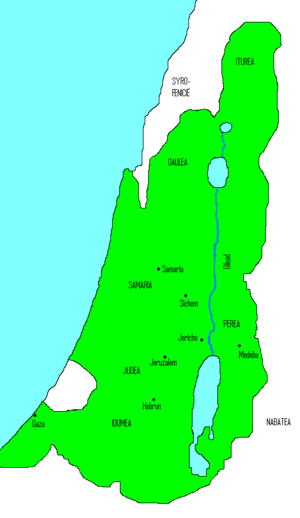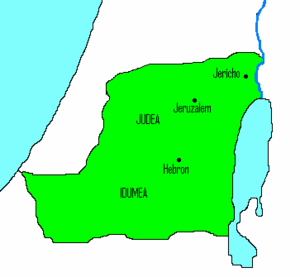Hyrcanus II facts for kids
Quick facts for kids Hyrcanus II |
|
|---|---|
|
|

Hyrcanus from Guillaume Rouillé's Promptuarii Iconum Insigniorum
|
|
| King of Judaea | |
| Reign | c. 67 – 66 BCE |
| Predecessor | Salome Alexandra |
| Successor | Aristobulus II |
| High Priest of Judaea | |
| Reign | c. 76 – 66 BCE |
| Predecessor | Alexander Jannaeus |
| Successor | Aristobulus II |
| Reign | 63 – 40 BCE |
| Predecessor | Aristobulus II |
| Successor | Antigonus II Mattathias |
| Ethnarch of Judaea | |
| Reign | c. 47 – 40 BCE |
| Successor | Office abolished |
| Issue | Alexandra the Maccabee |
| Dynasty | Hasmonean |
| Father | Alexander Jannaeus |
| Mother | Salome Alexandra |
| Religion | Judaism |
John Hyrcanus II (died 30 BCE) was an important Jewish leader. He was a member of the powerful Hasmonean dynasty. For many years, he served as the Jewish High Priest. He was also briefly King of Judea from 67 to 66 BCE. Later, he became the ethnarch, or ruler, of Judea, likely from 47 to 40 BCE.
Contents
Becoming a Leader
Hyrcanus was the oldest son of Alexander Jannaeus, who was both King and High Priest. His mother was Alexandra Salome. When his father died in 76 BCE, his mother became the ruler of Judea. She made Hyrcanus the High Priest.
His father, Alexander, had many disagreements with the Pharisees. However, Hyrcanus later gained the support of the Pharisees.
When his mother, Salome, died in 67 BCE, she chose Hyrcanus to be the next ruler of Judea. But soon, Hyrcanus and his younger brother, Aristobulus II, began to fight. They both wanted to be king.
Losing the Throne
Hyrcanus had only been king for about three months. Then, his brother Aristobulus II started a rebellion. Hyrcanus led his mercenaries (paid soldiers) and followers to fight his brother.
They met in a battle near Jericho. Many of Hyrcanus's soldiers switched sides and joined Aristobulus II. This gave Aristobulus the victory.
Hyrcanus sought safety in the fortress of Jerusalem. But Aristobulus II captured the Temple. This forced Hyrcanus to give up. They made a peace agreement. Hyrcanus agreed to give up the throne and his role as High Priest. However, he was allowed to keep the income from the High Priest's office.
Seeking Help from Allies
This agreement did not last long. Hyrcanus feared that Aristobulus was planning to kill him. His advisor, Antipater the Idumean, made these fears even stronger. According to the historian Josephus, Antipater wanted to control Judea. He thought he could do this by putting the weaker Hyrcanus back on the throne.
Hyrcanus then went to Aretas III, the King of the Nabataeans. Antipater had secretly paid Aretas to support Hyrcanus. He promised Aretas that he would get back Arabian towns that the Hasmoneans had taken.
The Nabataeans marched towards Jerusalem with a large army of 50,000 soldiers. They captured the city and surrounded the Temple. Aristobulus had taken shelter inside the Temple for several months.
During this siege, Josephus wrote about some events. He said that Hyrcanus's supporters killed a religious man named Onias. Onias had refused to pray for the defeat of their enemies. The priests fighting with Aristobulus were also angered. Hyrcanus's supporters sold them cattle for the Passover sacrifice. They charged a huge price of one thousand drachmae. Then, they refused to deliver the animals they had promised.
Roman Involvement
During a Roman civil war, the Roman general Pompey defeated armies from other kingdoms. He sent his assistant, Marcus Aemilius Scaurus, to take control of Syria.
The Hasmoneans were allies of the Romans. So, both Hyrcanus and Aristobulus asked Scaurus for help. Each brother tried to win him over with gifts and promises. Scaurus accepted a gift of 400 talents (a large sum of money). He decided to support Aristobulus. He ordered Aretas to take his army away. As the Nabataeans retreated, Aristobulus's forces attacked them. The Nabataeans suffered a big defeat. Scaurus then went back to Damascus.
When Pompey arrived in Syria in 63 BCE, both brothers sent representatives to him. A third group also sent delegates. This group wanted to remove the entire Hasmonean family from power. Some sources say this group represented the Pharisees. Pompey waited before making a decision. He preferred Hyrcanus over Aristobulus. He thought the older, weaker brother would be a more loyal ally to Rome.
Aristobulus suspected Pompey's plans. He fortified himself in the fortress of Alexandrium. But when the Roman army got close to Judea, he surrendered. He promised to hand Jerusalem over to them. However, many of his followers refused to open the city gates. So, the Romans attacked and captured the city by force. This caused a lot of damage to Jerusalem and the Temple. Aristobulus was taken to Rome as a prisoner. Hyrcanus was made High Priest again in Jerusalem.
Hyrcanus Returns to Power
Around 63 BCE, Hyrcanus was back as High Priest. But he was no longer King. The real power belonged to the Romans. Their interests were managed by Antipater. Antipater mostly worked to benefit his own family.
In 47 BCE, Julius Caesar gave Hyrcanus some political power back. He appointed him as ethnarch, a local ruler. However, this didn't change much. Hyrcanus still let Antipater make most of the decisions.
Life in Exile
In 40 BCE, Aristobulus's son, Antigonus Mattathias, joined forces with the Parthians. He was then declared King and High Priest. Hyrcanus was captured. He was also made unable to serve as High Priest ever again.
The Parthians took Hyrcanus as a prisoner to Babylonia. He lived there for four years among the Babylonian Jews. They treated him with great respect.
Return to Jerusalem and Death
In 36 BCE, Herod I had defeated Antigonus with Roman help. Herod feared that Hyrcanus might convince the Parthians to help him regain the throne. So, Herod invited the former High Priest to return to Jerusalem.
Hyrcanus accepted the invitation. Herod welcomed him with great honor. He gave Hyrcanus the best seat at his table and made him president of the state council.
However, in 30 BCE, Herod accused Hyrcanus of plotting with the Nabataeans. Herod then had him put to death. Josephus wrote that Hyrcanus was 80 years old when he died.
See also
- Hasmonean coinage
- Hyrcanus inscription
- Hyrcania
- Siege of Jerusalem (disambiguation), list of sieges for, and battles of, Jerusalem
 | Roy Wilkins |
 | John Lewis |
 | Linda Carol Brown |



